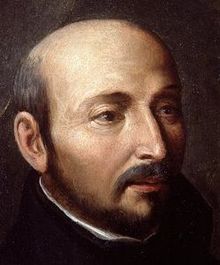Duluth, Minnesota (OpEdNews) January 9, 2022: The late multilingual American Jesuit Joseph F. Conwell (1919-2014), a seasoned spiritual director, turned 78 in 1997, the year in which his first post-Vatican II book Impelling Spirit: Revisiting a Founding Experience [in] 1539 [of] Ignatius of Loyola and His Companions: An Exploration into the Spirit and Aims of the Society of Jesus as Revealed in the Founder' Proposed Papal Letter Approving the Society (Chicago: Jesuit Way/ Loyola Press).
I read Conwell's 1997 book recently, and so I decided to take a look at his second post-Vatican II book, Walking in the Spirit: A Reflection on Jeronimo Nadal's Phrase 'Contemplative Likewise in Action' (St. Louis: Institute of Jesuit Sources). The seasoned spiritual director Conwell turned 84 in 2003.
As the subtitle indicates, Conwell's 2003 book is a reflection. The subject of Conwell's reflection is the life and activities of the talented early Jesuit Jeronimo Nadal (1507-1580). But Nadal was not one of those Jesuit founders in 1539 that Conwell discusses in his 1997 book. Conwell says, "Nadal was ordained a priest in Avignon in 1538, [and] a few days later received his doctor's degree in theology" (page 11). Nadal entered the Society of Jesus in 1545 (Conwell, 2003, page 145).
Not surprisingly, the life and activities of St. Ignatius Loyola (1491-1556), the founder of the Society of Jesus and the author of the Spiritual Exercises (which includes the prayer known as the Suscipe ["Take, Lord, receive"; standardized numbered paragraph 234:4-5]) and of the Society's Constitutions, also emerge prominently in Conwell's 2003 book.
Concerning the Spiritual Exercises of St. Ignatius Loyola, the most scholarly edition in English is the American Jesuit Louis J. Puhl's The Spiritual Exercises of St. Ignatius: Based on Studies in the Language of the Autograph (Westminster, MD: Newman Press, 1951).
Concerning the Constitutions written by St. Ignatius Loyola for the Society of Jesus, see The Constitutions of the Society of Jesus and Their Complementary Norms: A Complete English Translation of the Official [1995] Latin Texts (St. Louis: Institute of Jesuit Sources, 1996).
However, Conwell also claims that it is "a book for reflection" (page xix). That, it is. In other words, Conwell's 2003 book is not a straightforward biography of Jeronimo Nadal. But it is also not a straightforward exhortation for our edification - as is Pope Francis' 2013 apostolic exhortation Evangelii Gaudium, his first manifesto calling for church reform (i.e., for members of the church to re-form themselves in what is known in church parlance today as ongoing conversion), the text of which is available in English at the Vatican's website. Pope Francis excels in writing apostolic exhortations.
As everybody now knows, the cardinal-electors in the Roman Catholic Church elected the first Jesuit pope in 2013 - and then the Italo-Argentine spiritual son of the Spanish Renaissance mystic St. Ignatius Loyola promptly took the name Francis to honor the medieval Italian church reformer St. Francis of Assisi (1181?-1226), the founder of the Franciscan order of friars and the author of "The Canticle of Brother Sun."
For a brilliant analysis of that wonderful canticle, see the French Franciscan Eloi Leclerc's book The Canticle of Creatures: Symbols of Union: An Analysis of St. Francis of Assisi, translated by Matthew J. O'Connell (Chicago: Franciscan Herald Press,1977; orig. French ed., 1970).
The first Jesuit pope honors the spirit of St. Francis of Assisi in his widely read 2015 eco-encyclical Laudato Si', the text of which is available in English at the Vatican's website.
Because Conwell claims that his 2003 book is "a book for reflection," I want to enter into a spirit of reflection here on Pope Francis, the first Jesuit pope, in light of all the prompts for reflection that Conwell serves up in his 2003 book about Nadal and St. Ignatius Loyola. More specifically, I want to call attention here to the Italian philosophy professor Massimo Borghesi's new 2021 book Catholic Discordance: Neoconservatism vs. the Field Hospital Church of Pope Francis, translated by Barry Hudock (Collegeville, MN: Liturgical Press Academic).
Without in any way diminishing the possible inspiration of the cardinal-electors by the Holy Spirit, Borghesi calls attention to Cardinal Bergoglio's "address to the cardinals of the church just prior to the conclave that elected him pope" (page 218). Cardinal Bergoglio's address to the cardinal-electors is titled "Evangelizzare le periferie" and is available in Sandro Magister, "Le ultime parole di Bergoglio prima del conclave," Settimo Cielo blog, L'Expresso, March 27, 2013 (Borghesi, page 218, note 8).
Borghesi then quotes the following lengthy passage from Cardinal Bergoglio's address to the cardinal-electors:
"When the church does not come out from itself to evangelize, it becomes self-referential and gets sick (one thinks of the woman hunched over upon herself in the Gospel). The evils that, in the passing of time, afflict the church's institutions are rooted in self-referentiality, in a sort of theological narcissism. In Revelation, Jesus says that he stands at the door and knocks. . . . But at times I think that Jesus may be knocking from the inside, so that we will let him out. The self-referential church presumes to keep Jesus Christ inside and not let him out.
(Note: You can view every article as one long page if you sign up as an Advocate Member, or higher).





